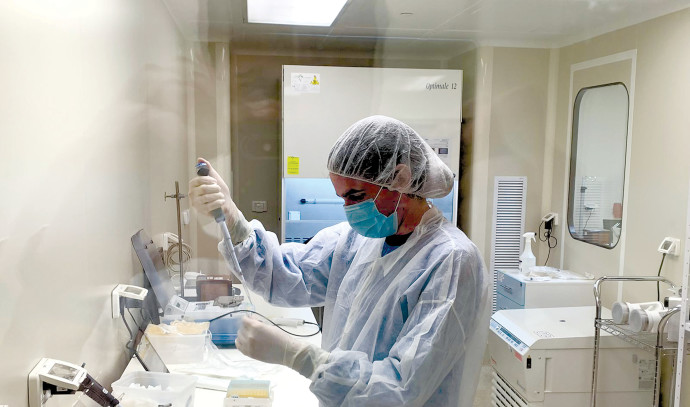Israel’s Enlivex Therapeutics announced a clinical collaboration with China’s BeiGene to evaluate the safety and efficacy of combining macrophage reprogramming and an anti-PD-1 immune checkpoint inhibitor to improve the treatment of patients with advanced-stage solid tumors.
Enlivex’s Allocetra is based on technology discovered by Hadassah-University Medical Center’s Prof. Dror Mevorah. It is designed to reprogram macrophages, a type of white blood cell that has an anti-cancer role, into their homeostatic state—meaning stronger anti-cancer activity.
BeiGene is considered one of the leading companies in the world in the area of cancer immunotherapies, trades on NASDAQ and has a current market capitalization of $25 billion. The company developed Tislelizumab, an anti-PD-1 immune checkpoint inhibitor. The drug is approved for various cancer indications in China, and Novartis, a large pharmaceutical company, partnered with BeiGene to market the product in the United States and Europe. According to the BeiGene investor presentation, Novartis/BeiGene expect to receive marketing approval in Europe this year, and submit a request for approval from the US Food & Drug Administration, for various indications.
Tislelizumab generated more than $400 million in revenues for BeiGene in 2022.
PD1 stands for “programmed cell death protein 1” and is found on T cells. The protein helps keep immune cells from killing others, including cancer cells.
“Combinatorial approaches for fighting difficult-to-treat cancers historically have proven to be important in delivering better treatments to patients,” said Enlivex CEO Oren Hershkovitz in a press release issued by Enlivex. “We believe that the pre-clinical data observed to date for Allocetra, with its unique macrophage-modulation properties and immune checkpoints, support the evaluation of the combination for treating patients with the Tislelizumab-Allocetra combinations.”
Enlivex to amend ongoing trial
Enlivex will amend its ongoing Phase I/II multicenter, open-label, dose escalation trial to include an evaluation of Allocetra in combination with Tislelizumab. The trial will enroll up to 48 patients with advanced solid tumors across two trial stages. The first stage will examine escalating doses of Allocetra administered once a week for three consecutive weeks. The second stage will evaluate the same escalating doses combined with Tislelizumab.
On their own, anti-PD1 checkpoint inhibitors have become major blockbuster biological drugs, and are today the last line of treatment for cancer patients. However, up to 80% of cancer patients with the most challenging tumors do not respond to approved cancer immunotherapies, including anti-PD-1 inhibitors that are already approved, such as Merck & Co.’s Keytruda and Bristol-Myers Squibb’s Opdivo. Nonetheless, Merck sells around $20 billion a year of Keytruda, as these anti-PD1 drugs are the best available treatment options for many cancers.
BeiGene was founded in 2010 and reported $1.3 billion in annual product revenue last year. The company employs more than 9,000 people on five continents and has more than 20,000 people enrolled in 110 clinical trials. The average analyst consensus 12-month price for BeiGene is $303.
Enlivex trades on NASDAQ and has a small market capitalization of $50 million. H.C. Wainwright biotech analyst Raghuram Selvaraju gave a $15 target price for Enlivex.
Scientists are looking for another way to solve the cancer tumor crisis, and a hope is that combination therapies could play a role. The idea is that one drug would attack a particular mechanism and the other another, increasing patient response rates.
All the people enrolled in the Enlivex trial were treated prior to the trial with an anti-PD1 checkpoint inhibitor and did not respond, leaving limited options, if any.
If the trial is successful, it will ratify the promising results of multiple pre-clinical studies of Allocetra in combination with other cancer-fighting treatments that were released last year. In one, conducted in collaboration with Yale Cancer Center, mice with ovarian cancer that received a combination therapy of Allocetra and anti-PD1 immune checkpoint inhibitors showed an 83% increase in survival duration.
In another, mice suffering from mesothelioma—one of the deadliest solid cancers—showed up to a 100% survival in the combination therapy of Allocetra and the anti-CTLA4 immune checkpoint inhibitor, compared to a 0% survival rate in untreated mice and up to a 25% survival rate in the group treated only with a commercially approved anti-CTLA4 inhibitor.
Enlivex Therapeutics was a sponsor of the 2022 Jerusalem Post Annual Conference. For more information about the 2023 Annual Conference, visit www.jpost.com/AC23.




